Silvanus Forestry Ltd. and Hungaroplant Ltd. ‘turbo’ charge timber yield and timber value through new varieties and technologies
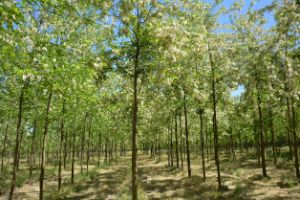 A leading player in the European forestry industry is celebrating a successful research and development project to hugely increase timber yield and quality and hence timber value in its plantations.
A leading player in the European forestry industry is celebrating a successful research and development project to hugely increase timber yield and quality and hence timber value in its plantations.
Efforts to boost yield were begun as the traditional production framework of the black locust tree - a popular timber for fuel, fencing and furniture - was struggling to meet the demands of the market and the principles of environmental consciousness.
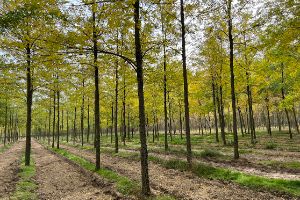 Now Hungary based Silvanus Forestry Ltd says that after more than 20 years of research and development with partner HungaroPlant Ltd, its new clone variety of the black locust and specific cultivation methods can produce twice as much timber as typical Hungarian and traditional Black Locust trees over a 15-year planting rotation.
Now Hungary based Silvanus Forestry Ltd says that after more than 20 years of research and development with partner HungaroPlant Ltd, its new clone variety of the black locust and specific cultivation methods can produce twice as much timber as typical Hungarian and traditional Black Locust trees over a 15-year planting rotation.
Even more importantly, due to the maintenance of the plantations and the straight stem growth of the varieties, the timber produced is of exceptionally high quality, further increasing the value of the investment. This also means that we can talk about long-term carbon sequestration, as the timber is perfect for construction material, furniture or parquets as opposed to firewood utilisation.
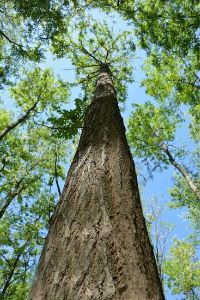 Hungaroplant Ltd. has also received significant subsidies from the Hungarian government, most recently within the VEKOP-2.1.1-15-2016-00166 framework. This project aimed at maximizing high quality black locust honey production as well as high quality wood yield with the aim of propagating black locust varieties with outstanding characteristics and delayed flowering in case of low temperatures in late spring. Samples were collected from late flowering trees across country which also showed good and straight growth, after which they were propagated and planted under controlled conditions. The best varieties were then selected which are now under propagation.
Hungaroplant Ltd. has also received significant subsidies from the Hungarian government, most recently within the VEKOP-2.1.1-15-2016-00166 framework. This project aimed at maximizing high quality black locust honey production as well as high quality wood yield with the aim of propagating black locust varieties with outstanding characteristics and delayed flowering in case of low temperatures in late spring. Samples were collected from late flowering trees across country which also showed good and straight growth, after which they were propagated and planted under controlled conditions. The best varieties were then selected which are now under propagation.
Within a different project, they have also established the only progeny tested Black Locust seed orchard in the world, which provides the ‘Turbo’ seedling variety, which is a cheaper alternative to the cloned ‘Turbo Obelisk’.
The two companies have published a research paper detailing how they produced the Robinia pseudoacacia ‘Turbo Obelisk’ species and developed the necessary cultivation techniques specifically for intensive industrial wood production plantations.
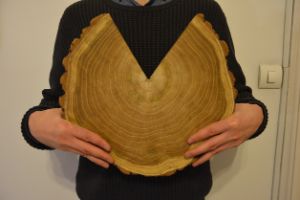 They say the varieties show ideal characteristics for industrial timber production - fast growth, high demand for light, intensive surface root system, strong canopy formation at a young age and high tolerance for low quality, dry marginal soils.
They say the varieties show ideal characteristics for industrial timber production - fast growth, high demand for light, intensive surface root system, strong canopy formation at a young age and high tolerance for low quality, dry marginal soils.
The firms’ researchers also say the Turbo Obelisk’s extremely high industrial wood output can provide a significant contribution to the conservation and maintenance of natural ecosystems, whilst the CO2 sequestration per unit area/per time is also several times that of natural forests.
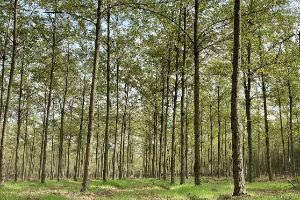 The variety has also displayed exceptional tolerance against drought, pollution and low-quality soils, making it suitable for use in areas which is poor for agricultural production, a development that could significantly increase the advancement of less developed regions.
The variety has also displayed exceptional tolerance against drought, pollution and low-quality soils, making it suitable for use in areas which is poor for agricultural production, a development that could significantly increase the advancement of less developed regions.
A spokesperson said: “The unique cloned varieties and the cultivation technologies which we developed greatly increase efficiency and yield and allow for the large-scale utilisation of low quality, marginal soils around the world as it focuses on both economic and environmental aspects.
“We feel that it can become a realistic direction for reform within the sector and that it also offers opportunities in terms of agroforestry and high-quality honey production as side revenue.”
In addition to plantation cultivation, it also provides a cost-effective solution for the establishment of protective forest belts, road-side plantings, quicksand fixation and soil renovation.
The global exploitation of the research findings has begun, with test plantations already successfully established in China, India, and Pakistan, as well as in several European countries. The varieties will now also be tested in Uzbekistan, Saudi Arabia and the United Kingdom, with 8 test plots being established in early 2023.
To read more about the breeding methodology and growth results you can read the paper here: https://www.farmdiversity.co.uk/downloads/Silvanus-Forestry-Paper-2021.pdf
- Log in to post comments

